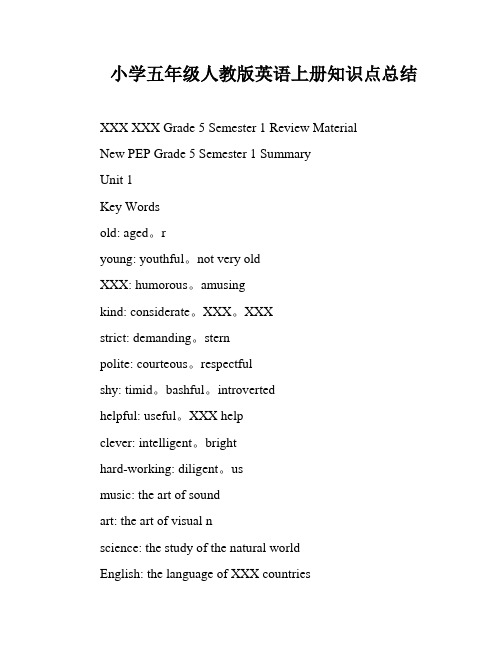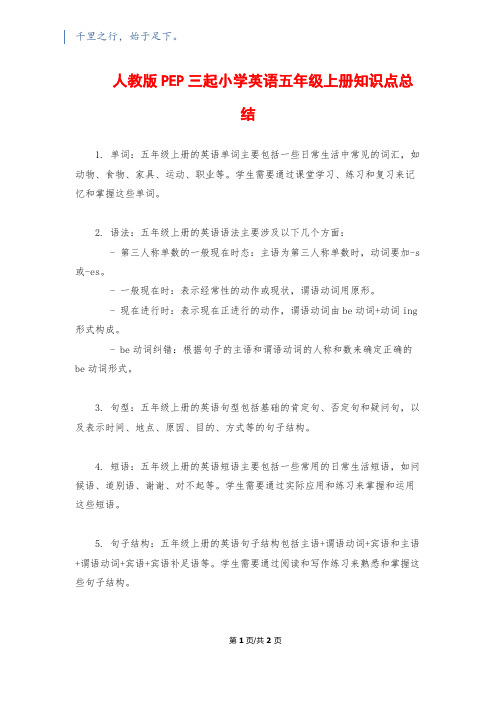人教版五年级英语上册重点句型总结与练习
小学五年级人教版英语上册知识点总结

小学五年级人教版英语上册知识点总结XXX XXX Grade 5 Semester 1 Review MaterialNew PEP Grade 5 Semester 1 SummaryUnit 1Key Wordsold: aged。
ryoung: youthful。
not very oldXXX: humorous。
amusingkind: considerate。
XXX。
XXXstrict: demanding。
sternpolite: courteous。
respectfulshy: timid。
bashful。
introvertedhelpful: useful。
XXX helpclever: intelligent。
brighthard-working: diligent。
usmusic: the art of soundart: the art of visual nscience: the study of the natural worldEnglish: the language of XXX countriesXXX: the study of numbers and their propertiesChinese: the language of Chinasometimes: nally。
now and thenrobot: a machine that can perform XXXspeak: to use a language to communicateKey XXX1."Who's your art teacher?" - "Mr。
Jones."2."Is he young?" - "Yes。
he is." / "No。
he isn't."3."What's Wu Yifan like?" - "He's hard-working."4."Ms Wang will be our new Chinese XXX."5."XXX."6."Robin is short but strong."7."He can speak Chinese and English."8."XXX"XXXXXX "y" in words: XXX words。
人教版PEP三起小学英语五年级上册知识点总结

千里之行,始于足下。
人教版PEP三起小学英语五年级上册知识点总
结
1. 单词:五年级上册的英语单词主要包括一些日常生活中常见的词汇,如动物、食物、家具、运动、职业等。
学生需要通过课堂学习、练习和复习来记忆和掌握这些单词。
2. 语法:五年级上册的英语语法主要涉及以下几个方面:
- 第三人称单数的一般现在时态:主语为第三人称单数时,动词要加-s 或-es。
- 一般现在时:表示经常性的动作或现状,谓语动词用原形。
- 现在进行时:表示现在正进行的动作,谓语动词由be动词+动词ing 形式构成。
- be动词纠错:根据句子的主语和谓语动词的人称和数来确定正确的be动词形式。
3. 句型:五年级上册的英语句型包括基础的肯定句、否定句和疑问句,以及表示时间、地点、原因、目的、方式等的句子结构。
4. 短语:五年级上册的英语短语主要包括一些常用的日常生活短语,如问候语、道别语、谢谢、对不起等。
学生需要通过实际应用和练习来掌握和运用这些短语。
5. 句子结构:五年级上册的英语句子结构包括主语+谓语动词+宾语和主语+谓语动词+宾语+宾语补足语等。
学生需要通过阅读和写作练习来熟悉和掌握这些句子结构。
第1页/共2页
锲而不舍,金石可镂。
总的来说,五年级上册的英语主要涉及基础词汇、语法、句型和句子结构等方面的知识点,学生需要通过课堂学习和练习来掌握并应用这些知识点。
人教版英语五年级上册Unit 1 What’s he like单元重难点知识归纳总结

人教版英语五年级上册Unit 1 What’s he like?【重点词汇】1.old /əʊld/ 老的;年纪大的2.young /jʌŋ/ 年轻的;岁数不大的3.funny /'fʌnɪ/ 滑稽;可笑的4.kind /kaɪnd/ 体贴的;慈祥的;宽容的5.strict /strɪkt/ 要求严格的;严厉的6.polite /pə'laɪt / 有礼貌的;客气的7.hard-working /ˈhɑːdˈwɜːkɪŋ/ 工作努力的;辛勤的8.helpful /'helpfʊl/ 有用的;愿意帮忙的9.clever 'klevə/ 聪明的;聪颖的10.shy /ʃaɪ/ 羞怯的;腼腆的;怕生气的11.know /nəʊ/ 知道;了解12.our /aʊə/ 我们的13.Ms /mɪz/ (用于女子的姓氏或姓名前,不指明婚否)女士14.will /wɪl/ (谈及将来)将要15.sometimes /'sʌmtaɪmz/ 有时;间或16.robot /'rəʊbɒt/ 机器人17.him /hɪm / (用作宾格或表语)他18.speak /spiːk/ 会说;会讲(某种语言);用(某种语言)说话19.finish /'fɪnɪʃ / 完成;做好【重点句型】1.This is Amy. She's quiet. She's very hard-working.这是艾米。
她很内向。
她很努力。
2.That is Wu Yifan. He's very clever. He's polite, too.那是吴一凡。
他很聪明。
他也很有礼貌。
3.—Ms Wang will be our new Chinese teacher. What's she like?王女士会成为我们的新语文老师。
她是怎样的人?—She's very kind.她很平易近人。
人教版五年级上册英语全单元 连词成句汇总练习

人教版五年级上册英语全单元连词成句汇总练习一、Unit 1 What's he like? 单元连词成句练习。
题目1。
old, is, your, who, art, teacher (?).答案:Who is your old art teacher?解析:这是一个特殊疑问句,疑问词“who”放在句首,用来询问人。
“is”是系动词,“your old art teacher”是句子的主语部分。
题目2。
funny, he, very, is (.).答案:He is very funny.解析:这是一个简单的陈述句,主语“he”放在句首,“is”是系动词,“very funny”用来描述主语的特征,放在系动词后面。
举例:比如在描述自己喜欢的老师时,就可以用“He is very funny.”来说明这个老师很有趣。
二、Unit 2 My week 单元连词成句练习。
题目1。
do, what, you, on, do, weekends (?).答案:What do you do on weekends?解析:这是一个特殊疑问句,“what”作为疑问词询问做什么,“do”是助动词,用来构成疑问句语序,“you”是主语,“on weekends”表示时间,放在句末。
often, I, TV, watch, on, Saturdays (.).答案:I often watch TV on Saturdays.解析:这是一个陈述句,主语“I”放在句首,“often”是频率副词,一般放在实义动词前面,“watch TV”是谓语动词短语,“on Saturdays”表示时间,放在句末。
案例分析:假如你要和朋友分享自己周末的日常活动,就可以说“I often watch TV on Saturdays.”告诉他你经常在周六看电视。
三、Unit 3 What would you like? 单元连词成句练习。
人教版小学英语五年级上册句型总结

1.-Who's ...?-人。
-Who's your art teacher?-Mr Jones.-Who's Mrs Smith?-She's the head teacher.2.-Is he/she +形容词?-Yes, he/she is. / No, he/she isn't. -Is he young?-Yes, he is.-Is she strict?-Yes, sometimes.3.-Do you know...?-Yes, I do. / No, I don't.-Do you know Mr Jones?-No, I don't.-Do you know her?-Yes, I do.4.-What's ... like?-He / She is +形容词。
-What's Wu Yifan like?-He's hard-working.-What's she like?-She's quiet.-What are they like?-They are polite.5.-What do you have ...?-I have...-What do you have on Mondays?-I have Chinese, English, maths and music.-What do you have on Thursdays?-I have maths, English and music.6.-Do you often...?-Yes, I do. / No, I don't.-Do you often wash your clothes on the weekend?-Yes, I do.-Do you often listen to music?-No, I don't.7.-What do you often do ...?-I often ...-What do you often do on the weekend?-I often do homework, watch TV and draw pictures on the weekend. -What do you often do on the weekend?-I often clean my room and play the pipa on the weekend.8.-What would you like to eat?-I'd like ...-What would you like to eat?-I'd like a sandwich, a hot dog, a hamburger... -What would you like to eat?-A sandwich, please.9.-What would you like to drink?-I'd like ...-What would you like to drink?-I'd like some water.-What would you like to drink?-Some tea, please.10.-What's your favourite food?-食物。
人教版五年级上册英语知识点汇总

人教版五年级上册知识点汇总Unitl What' shelike?一、 重点单词old 老的,年纪大的 young 年轻的,岁数不大的 funny 滑稽的,可笑的 kind 体贴的,慈祥的,宽容的 strict 要求严格的,严厉的 polite 有礼貌的,客气的 shy 羞怯的,腼腆的,怕生的 helpful 有用的,愿意帮忙的 clever 聪明的,聪颖的 what' s=whatis?who ' s=whois?she二、 重点句子speak 会说,会讲(某种语言);active 积极的、活跃的 principal 校长universitystudent 大学生 like 像、喜欢 quiet 安静的;文静的 tall 高的 short 矮的 very 很、非常What'she/shelike?He/Sheis+与身体特Yes,sheis,butshe ' sverykind.是的,但她很和蔼的。
(三)、询问人的外貌或性格特征3.What' s WuYifan like ?吴一帆怎样? He' shard -working.他很勤奋。
4.一What' shelike?他什么样? 一 Hestallandstrong. 他又高又壮。
(四)、句子5. MsWanwillbe ournewChineseteacher. 王老师会成为我们的新语文老师。
6. Heisveryhelpfulathome.他在家很能干。
7. Robinisshort but strong.罗宾个子矮,但是身体强壮。
8. HecanspeakChineseandEnglish .他会说中文和英语。
9.Hemakesmefinishmyhomework.他让我写作业。
三、语音一字母y 在单词中的发音:1、双音节或多音节词末发[i]:例:babyhappywindysunn ysorr ycandymaryfamil ypart y婴儿开心的有风的晴朗的对不起糖果许多家庭聚会 课外补充:2、y 在单音节t ^末发[ai]例:by_乘坐ny_我的whyj^什么cry_哭fl y_飞(Who, What 引导的特殊疑问句,用来对不熟悉的老师进行问答:Who's+某人?征和性格特征有关的形容词。
人教版五年级上册英语知识点汇总
人教版五年级上册英语知识点汇总一、词汇1. 日常生活词汇•家庭生活相关词汇(如housework, chores, cleaning, cooking等)•饮食习惯与健康(如healthy, unhealthy, fruit, vegetable, junk food等)•购物与交易(如shop, market, buy, sell, price等)2. 学校与学习•学习态度与方法(如study hard, careful, practice, revise等)•学科词汇扩展(如physics, geography, history等)•学校活动与规则(如rules, library rules, school trip, sports day等)3. 自然与环境•天气与自然现象(如cloudy, foggy, thunder, lightning等)•动物与植物世界(如wild animals, rainforest, plant, tree species等)4. 情感与社交•情感表达词汇(如happy, sad, angry, excited, surprised等)•社交技能与礼仪(如invite, thank, apologize, polite, impolite等)二、语法1. 现在进行时复习与深入•巩固现在进行时的基本用法,进一步学习在不同语境中的应用。
2. 一般过去时•学习并掌握一般过去时的基本结构和用法,用于描述过去发生的动作或状态。
•句型:主语+ 动词过去式+ 其他成分3. 情态动词的初步接触•学习几个基本的情态动词(如can, could, may, might, should, must等)的基本用法和区别。
4. 简单的形容词比较级和最高级复习•复习并巩固形容词比较级和最高级的用法,注意规则变化与不规则变化。
三、句型与对话•能够围绕日常生活、学校生活、兴趣爱好等话题进行流畅的对话和交流。
人教版PEP五年级上册期末复习(单词+句型+语音+语法+句型)
.人教版PEP五年级上册期末复习Unit 1(一)重点单词old老的,年纪大的young 年轻的,岁数不大的funny 滑稽的,可笑的kind 体贴的,慈祥的,宽容的strict 要求严格的,严厉的polite 有礼貌的,客气的shy 羞怯的,腼腆的,怕生的helpful有用的,愿意帮忙的clever 聪明的,聪颖的hard-working努力的,辛勤的music 音乐art 美术science 科学English英语maths/math 数学Chinese 语文,中文(二)重点句子1.—Who’s your art teacher? 谁是你的美术老师?—Mr. Jones.琼斯老师。
2. —Is heyoung? 他年轻吗?—Yes,heis./ No, he isn’t.是的,他年轻。
/ 不,他不年轻。
3.—What’sWuYifanlike?吴一帆怎样?—He’shard-working. 他很勤奋。
4. Ms Wang will be our newChinese teacher. 王老师会成为我们的新语文老师。
5. Robinis shortbutstrong. 罗宾个子矮,但是身体强壮。
6.He can speak Chinese and English.他会说中文和英语。
(三)语音字母y在单词中的发音:1、双音节或多音节词末发[ i ]。
例:baby happy windy sunny sorry candy manyfamily party课外补充:2、y在单音节词末发[ ai ]例:by 乘坐my 我的why 为什么cry 哭fly 飞(四)重点知识及语法1、询问他人的外貌或性格:-What’she/she like?- He/Sheis kind/…2、一般疑问句的问与答:—Is he/she…?—Yes, he/she is.—No, he/sheisn’t.—Do you know…? —Yes, Ido. /No, I don’t3、be 动词的三种形式am , is, ar e与人称代词连用的用法: I + am , He, sh e, it/人名/物名+ is We, yo u, th ey + are4、Ms ., Miss, Mr ., Mrs.的区别:Ms. [miz](缩略词)(用于女子的姓氏或姓名前,不指明婚否)女士;Miss [mis ](用于未婚女子的姓氏或姓名前,以示礼貌)小姐,女士;Mr. [mis t](mister 的缩略词)(用于男子的姓氏或姓名前)先生;M rs . [m isiz](用于已婚女子的姓氏或姓名前)太太;夫人。
小学五年级人教版英语上册知识点总结
新版PEP 五年级上册知识点总结Un it 1old 老的,年纪大的 you ng 年轻的,岁数不大的 funny 滑稽的,可笑的kind 体贴的,慈祥的,宽容的 strict要求严格的,严厉的 polite 有礼貌的,客气的helpful 有用的,愿意帮忙的 clever聪明的,聪颖的hard-work ing 工作努力的,辛勤的music 音乐 art 美术 scie nee 科学Who' syour art teacher一Mr. Jones 琼斯老师。
2. — Is he you ng 他年轻吗—Yes, he is. 是的,他年轻。
一No, he isn ' t.不,他不年轻。
3. — What ' Wu Yifan like吴一帆怎样 一He ' s harWorking.他很勤奋。
4. Ms Wang will be our new Chinese teacher.王老师会成为我们的新语文老师。
5. He is very helpful at home. 他在家很能干。
6. Robi n is short but stron g. 罗宾个子矮,但是身体强壮。
7. He can speak Chin ese and En glish. 他会说中文和英语。
8. He makes me fin ish my homework.他让我写作业。
字母y 在单词中的发音:1、双音节或多音节词末发 [i ]。
例:baby happy windy_ sunny sorry candy many family party婴儿 开心的 有风的晴朗的对不起 糖果 许多 家庭 聚会 课外补充:2、y 在单音节词末发[ai ] 例:by 乘坐 my 我的 why 为什么 cry 哭 fly 飞重点知识及语法丨1、 询问他人的外貌或性格: -What ' he/she like - He/She is kind/…2、 一般疑问句的问与答: 一Js he/she • — Yes, he/she is. — No, he/she isn' t.—Do you know … —Yes, I do. — No, I don '3、be 动词的三种形式 am, is, are 与人称代词连用的用法: 1 + am,------------------------------------------------------------------------------------------------------ He, she, it ,人名、物名+ is 识记口诀:我用am,你用are, is 用于他、她、它,所有复数都用are 。
五年级人教版英语上册Unit4句子重点总结
五年级人教版英语上册Unit4句子重点总结 Areyouhelpfulathome?你在家里很能干吗?Sure.当然。
Ihavenotimetoplay. ___时间去玩了。
Whatcanyoudo?你能干?Icansweepthefloor.我能扫地。
Whatcanshedo?她能做什么?Shecanwatertheflowers.她会浇花。
WhatcanMikedo?Mike会做什么?Hecanemptythetrash.他会倒垃圾。
Whatcanthebirddo?鸟儿会做什么?Itcanflyinthesky.它会在天空中飞翔。
Canyousetthetable?你会摆饭桌吗?Yes,Ican.是的,我会.No,Ican’t,butI’dliketohaveatry!不,我不会,但是我想试一试!CanAmywashtheclothes?Amy会洗衣服吗?Yes,shecan.No,shecan’t.是的,她会。
不,她不会。
Canhedothedishes?他会洗衣服吗?Yes,hecan.No,hecan’t.是的,他会。
不,他不会。
Canthedogrun?狗会跑吗?Yes,itcan.是的,它会。
Cantherabbitfly?兔子会飞吗?No,itcan’t.不,它不会。
1、can后面的动词用原型。
2、疑问句作答时,需要转换人称,问句中是you,答句用Iwe;问句是男的,用he;问句是女的,用she;问句是动物或物品时,用it;问句是(他她它)们,答句用they。
3、棋类和球类中间不加the。
如:playbasketballfootballping-pong,playchess…乐器中间有the。
如:playthepianoerhuviolin…模板,内容仅供参考。
- 1、下载文档前请自行甄别文档内容的完整性,平台不提供额外的编辑、内容补充、找答案等附加服务。
- 2、"仅部分预览"的文档,不可在线预览部分如存在完整性等问题,可反馈申请退款(可完整预览的文档不适用该条件!)。
- 3、如文档侵犯您的权益,请联系客服反馈,我们会尽快为您处理(人工客服工作时间:9:00-18:30)。
百度文库 - 让每个人平等地提升自我 1 人教版--五年级英语上册重点句型总结与练习
Unit1 What’s he like? 询问某人外貌特征或性格特点的句型 ’s +主语(第三人称单数)+like? “某人什么样?” He/She/Wu Yifan is +表示外貌特征或性格特点的形容词. 例:What’s Miss Chen like? She is kind. 动词+主语+表示外貌特征或性格特点的形容词? 肯定回答:Yes, 主语+be动词. 否定回答:No, 主语+be动词+not. 例:Is your Chinese teacher strict? Yes, she is. 练一练,我会做! 1. _Who’s_ your music teacher? ---Miss White. 2. _What’s_ your English teacher like ? ---She is kind and funny. 3. I __am___ helpful. (be) 4. The girl___is__ polite. (be) 5. They _are__ hard-working. (be) 6. He is very funny. (改写成一般疑问句) Is he very funny? 7. Mr Gao is our Chinese teacher. (改写成否定句) Mr Gao isn’t our Chinese teacher. 8. Is he old ? ( 作否定回答) No, he isn’t. ’s thin and tall. (就划线部分提问) What’s she like? 10.我们的数学老师很严厉。(翻译) Our maths teacher is strict. Unit2 My week 1. 询问今天星期几:What day is it today? It is +星期(Monday, Tuesday...) 2. 询问你在星期几有什么课的句型: What do you have on +星期名称? I / We have +课程名称. 例:What do you have on Mondays? I have Chinese, maths and English. 3. 询问对方“经常做某事吗”的句型: Do you often +动词原形+其他(时间状语/地点状语)? 肯定回答:Yes, I do. 否定回答:No, I don’t. 例:Do you often play the pipa on the weekend? No, I don’t. 4. 询问你经常做什么的句型: What do you often +do+其他(时间状语/地点状语)? I/We often... 例:What do you often do on the weekend? I often read books. 练一练,我会做! do you have on Thursday? I have Chinese and English. 2. Do you often listen to music on the , I do. 3. What do you often do on the weekend? I often play ping-pong. 4. I have art, maths and music on Tuesday.(就划线部分提问) What do you have on Tuesday? 5. I often read books in this park.(改为一般疑问句) Do you often read books in this park? 6. Do you often play football on the weekend?(作否定回答) No, I don’t. 7. What day is it today?(就实际情况回答) It’s Tuesday.
Unit3 What would you like? 1.询问对方想吃什么的句型: What would you like to eat? a hamburger, please. I’d like an apple. some sandwiches, please. /A sandwich, please. 2.询问对方想喝什么的句型: What would you like to drink? I’d like some tea. 3.询问对方最喜欢的东西(食物/课程......)的句型? What’s your favourite food? 食物名称./ I love +食物名称. / My favourite food is+食物名称. 百度文库 - 让每个人平等地提升自我 2 例:What’s your favourite food? Noodles. / I love noodles. / My favourite food is noodles. 4.描述食物的味道的句型: 主语+be动词+表示食物味道的形容词. 例:It is sweet. The vegetables are healthy. They’re delicious. 练一练,我会做! 1. What would you like to eat ? I’d like a sandwich, please. 2. What would you like to drink ? I’d like some water, please. 3. It is hot.(be) 4. The vegetables are delicious.(be) 5. They are fresh.(be) 6. I’d like some hamburgers .(hamburger) 7. What is your favourite food?----Salad. Unit4 What can you do? 1.询问对方会做什么的句型 What can you do? I / We can +动词原形. 例:What can you do for the party? I can play the piano. 2. 询问对方“会做某事吗”的句型 Can you + 动词原形+其他(时间状语/地点状语)? 肯定回答:Yes, I/we can. 否定回答:No, I/we can’t. 例:Can you cook at home? Yes, I can. 练一练,我会做! 1. What can you do? I can swim .(swim) 2. Can you cook ? No, I can’t . 3. Can you cook ? Yes, I can. 4. Can you wash your clothes at home?( 做否定回答) No, I can’t. 5. I can sing English songs. (改为否定句) I can’t sing English songs. 6. I can do some kung fu.(改为一般疑问句) Can you do any kung fu? 7. I can play the erhu for the party.(就划线部分提问) What can you do for the party?
Unit5 There is a big bed. Unit6 In a nature park 1.询问某地有什么:What's in the room/park? 回答“某处有某人”:There+be动词+某人/某物(+地点). (1)单数句:There+is +a/an+可数名词单数(+地点). 例: There is a big bed in my room. 改为否定句:There isn’t a big bed in my room. (2)复数句:There+are +(some/many/lots of...)可数名词复数(+地点). 例: There are some trees in the forest. 改为否定句:There aren’t any trees in the forest. 2.询问“某处有什么吗”的句型 Be动词+there+某人/某物(+地点)? 肯定回答:Yes, there+ be. 否定回答:No, there+ be+not. 单数句:Is there a/an +可数名词单数(+地点)? 肯定回答:Yes, there is. 否定回答:No, there isn’t. 例: Is there an apple on the plate? No, there isn’t. 复数句:Are there any +可数名词复数(+地点)? 肯定回答:Yes,there are. 否定回答:No, there aren’t. 例: Are there any lakes in the nature park? Yes, there are. 3. 询问物品在哪里: Where is + 某种物品? It is+表示方位的介词+其他. 例: Where is the ball? It is beside the dog. 练一练,我会做! 1.There is a tree beside the house.(be) 2.There is an apple and an egg on the plate.(a/an) 3.There are some hills in front of the house.(be) 4.Are there any villages in the nature park?(some)----Yes, there are . 5.Are there any buildings in the nature park?(building) ----No, there aren’t . 6. What’s in the room? There is a big bed. 7. Where is the desk? It’s in front of the chair.
